Related Research Articles

The Bengali language movement was a political movement in former East Bengal advocating the recognition of the Bengali language as an official language of the then-Dominion of Pakistan in order to allow its use in government affairs, the continuation of its use as a medium of education, its use in media, currency and stamps, and to maintain its writing in the Bengali script.
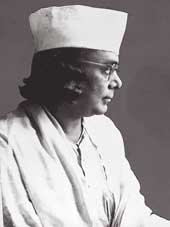
Bengali literature denotes the body of writings in the Bengali language and which covers Old Bengali, Middle- Bengali and Modern Bengali with the changes through the passage of time and dynastic patronization or non-patronization. Bengali has developed over the course of roughly 1,300 years. If the emergence of the Bengali literature supposes to date back to roughly 650 AD, the development of Bengali literature claims to have 1,600 years of old. The earliest extant work in Bengali literature is the Charyapada, a collection of Buddhist mystic songs in Old Bengali dating back to the 10th and 11th centuries. The timeline of Bengali literature is divided into three periods: ancient (650-1200), medieval (1200-1800) and modern. Medieval Bengali literature consists of various poetic genres, including Hindu religious scriptures, Islamic epics, Vaishnava texts, translations of Arabic, Persian and Sanskrit texts, and secular texts by Muslim poets. Novels were introduced in the mid-19th century. Nobel Laureate Rabindranath Tagore is the best known figure of Bengali literature to the world. Kazi Nazrul Islam, notable for his activism and anti-British literature, was described as the Rebel Poet and is now recognised as the National poet of Bangladesh.
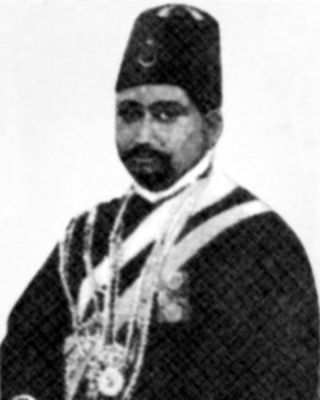
Syed Ismail Hossain Siraji was a Bengali author and poet from Sirajganj in present-day Bangladesh. He is considered to be one of the key authors of period of the Bengali Muslim reawakening; encouraging education and glorifying the Islamic heritage. He also contributed greatly to introducing the Khilafat Movement in Bengal, and providing medical supplies to the Ottoman Empire and its allies during the Balkan Wars. Anal-Prabaha, his first poetry book, was banned by the government and he was subsequently imprisoned as the first South Asian poet to allegedly call for independence against the British Raj. The government issued Section 144 against him 82 times in his lifetime.
Syed Ali Ahsan was a Bangladeshi poet, writer and university academic. He was awarded Ekushey Padak (1982) and Independence Day Award (1987) by the Government of Bangladesh. In 1987, he was selected as the National Professor of Bangladesh. He was credited as the official English translator of the National Anthem of Bangladesh.

Syed Mujtaba Ali was a Bengali writer, journalist, travel enthusiast, academic, scholar and linguist. He lived in Bangladesh, India, Germany, Afghanistan and Egypt.
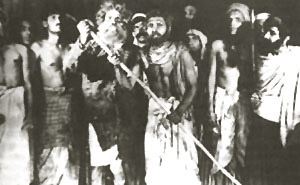
Bengali theatre primarily refers to theatre performed in the Bengali language. Bengali theatre is produced mainly in West Bengal, and in Bangladesh. The term may also refer to some Hindi theatres which are accepted by the Bengali people.
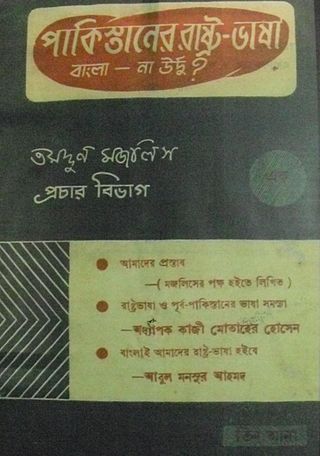
The Tamaddun Majlish, formerly Pakistan Tamaddun Majlish, is an Islamic cultural organization in Bangladesh, established in 1947 by Principal Abul Kashem in the former East Pakistan. It was one of the founding organizations of the Bengali Language Movement.
Mohammad Toaha was a language activist of the 1952 language movement and a prominent left-wing politician from Bangladesh.
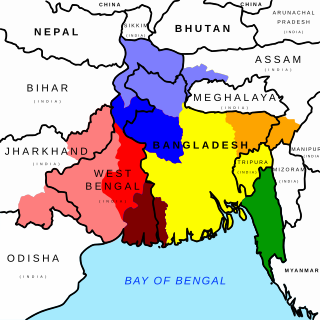
Bengalism or Bengali nationalism was a form of nationalism that focused on Bengalis as a singular nation. The people of Bengali ethnicity speak Bengali language. Bengalis mostly live across Bangladesh and the Indian states of Tripura and West Bengal. Bengali nationalism is one of the four fundamental principles according to the original Constitution of Bangladesh. and was the main driving force behind the creation of the Independent nation state of Bangladesh through the 1971 liberation war.
Kendriya Muslim Sahitya Sangsad is a literary organisation located in Sylhet, Bangladesh. It is the one of the oldest organisations of its kind in the Indian sub-continent and the oldest in Bangladesh. It was founded on 16 September 1936 by Muhammad Nurul Haque. It has the largest non-government collection of books, magazines, inscriptions etc. Some of them date back to the 13th century AD.
The Sylheti or Sylhetis are an Indo-Aryan ethnocultural group that are associated with the Sylhet region in South Asia, specifically in northeast of Bengal presently divided between the Sylhet Division of Bangladesh, and the Barak Valley of Assam, India. There are sizeable Sylheti populations in Hojai district of Assam, the Indian areas of Meghalaya, North Tripura and Manipur's Jiribam district. They speak Sylheti, an Eastern Indo-Aryan language, which is ambiguously considered as an independent language, or as a dialect of Bengali.

Bengali Muslims are adherents of Islam who ethnically, linguistically and genealogically identify as Bengalis. Comprising about two-thirds of the global Bengali population, they are the second-largest ethnic group among Muslims after Arabs. Bengali Muslims make up the majority of Bangladesh's citizens, and are the largest minority in the Indian states of West Bengal, Tripura and Assam.

The 1947 Sylhet referendum was held in the Sylhet District of the Assam Province of British India to decide whether the district would remain in Undivided Assam and therefore within the post-independence Dominion of India, or leave Assam for East Bengal and consequently join the newly-created Dominion of Pakistan. The referendum's turnout was in favour of joining the Pakistani union; however, the district's Karimganj subdivision remained within the Indian state of Assam.
The Mohammadi was a Bengali language monthly art journal. It was founded by Mohammad Akram Khan who worked as its editor.
Bangiya Mussalman Sahitya Samiti is a historic Bengali literary society that was founded in 1911 and was associated some of most well known literary figures of that era.
Muhammad Nurul Haque was a Bangladeshi cultural activist, social worker, and a writer.
Mohammad Rowshan Ali Chowdhury was a Bengali journalist, writer, poet and politician.

The Hon'ble Moulvi Khan Bahadur Syed Abdul Majid, CIE, also known by his daak naam Kaptan Miah, was a Bengali politician, lawyer and entrepreneur. He is notable for pioneering the development in the agricultural and tea industry in British India as well as his contributions to both secular and Islamic education in Sylhet.
Afzal Ali was a medieval Bengali poet. He is best known for his magnum opus, Nasihatnama. Abdul Karim Sahitya Bisharad claims that he belongs to the 16th-century, although Banglapedia places him in the 17th century.
Khan Sahib Syed Muhammad Afzal was a Bengali politician. He served as a member of both the Bengal Legislative Council and the Bengal Legislative Assembly. Afzal was noted an early supporter of the Bengali language movement.
References
- ↑ Roy, Anwesha (2018). Making Peace, Making Riots. Cambridge University Press. p. 133. ISBN 9781108428286.
- ↑ Bose, Neilesh (2013). "Purba Pakistan Zindabad: Bengali Visions of Pakistan, 1940–1947". Modern Asian Studies. 48: 1–36. doi:10.1017/S0026749X12000315. S2CID 145581131 . Retrieved 30 June 2018.
- 1 2 Ahmed, Wakil. "Purba Pakistan Sahitya Sangsad". en.banglapedia.org. Banglapedia. Retrieved 30 June 2018.
- ↑ Khondker, Habibul Haque (2016). "Nationalism and the 'Politics of National Identity'". In Riaz, Ali; Sajjadur Rahman, Mohammad (eds.). Routledge Handbook of Contemporary Bangladesh. Routledge. p. 33. ISBN 978-1-317-30877-5.
- ↑ "The historic Language Movement". The New Nation. Retrieved 30 June 2018.